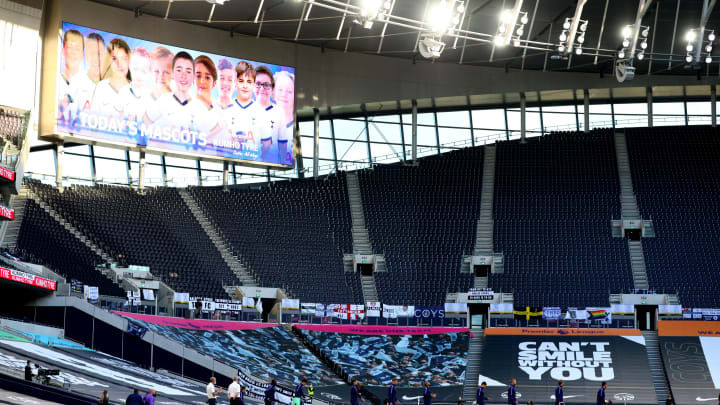How Teams Have Fared During Their First Season at a New Stadium

Keen to bolster their own pockets and *cough*, 'take the club to the next level', football owners across the continent are constantly angling to increase their stadium's capacity.
Sometimes this can't be achieved by a simple expansion. Sometimes an entire new stadium is required.
Tottenham are the latest proponents, moving into the unimaginably named Tottenham Hotspur Stadium earlier this season. Despite all the excitement created by the shiny arena, the first season at their new home has been incredibly underwhelming.
So, we here at 90min got to thinking about how other tenants have fared in their new homes - knowing you will be too - across Europe, during their inaugural season at a new stadium. And begin...
Southampton (St Mary's)
Expectations were high as Southampton left the derelict Dell behind and moved into a state of the art, if somewhat soulless, new home ahead of the 2001/2002 season.
Saints started the campaign horrifically and manager Stuart Gray paid with his job after just three months in permanent charge. Not before he broke the club's transfer record on Rory Delap though.
Gordon Strachan came in to save the club's season, guiding Southampton away from the relegation zone and into a safe mid-table finish.
First Season Rating: 6/10
Leicester (King Power Stadium/Walkers Stadium)
After a brief and thankfully unsuccessful bid to name it the Walkers' Bowl, Leicester finally moved into their new home ahead of the 2002/2003 season.
Off the pitch things were an absolute mess, with a combination of stadium costs and lavish spending in the transfer market putting the club into administration.
On the pitch, it was a different story. Despite all the problems bubbling away in the background the Foxes managed to win promotion back to the Premier League at the first time of asking, securing a second place finish in Division One.
First Season Rating: 9/10
Manchester City (City of Manchester Stadium)
Manchester City waved a tearful goodbye to Maine Road in 2003, moving into the City of Manchester Stadium that was first constructed for the city's Commonwealth Games' bid.
Despite the increased gate revenue and despite having footballing genius Kevin Keegan at the wheel, the club struggled.
After a lightning start Keegan's side faltered badly, eventually stuttering to a 16th placed finish. It was a disastrous campaign, especially considering City had come ninth the previous year. Many blamed the new stadium which failed to replicate the intimidating atmosphere of their former Moss Side home.
Season Rating: 3/10
Bayern Munich (Allianz Arena)
Built in preparation for the 2006 World Cup, Bayern Munich moved in the Allianz Arena one summer before the tournament.
What a season they had as well. Die Roten secured a domestic double, pipping Werder Bremen to the title by five points and defeating Eintracht Frankfurt 1-0 in the DFB Pokal final.
However, we should not ignore the stadium's other tenants. In a ludicrously tight 2.Bundesliga, 1860 Munich secured survival on the final day of the season at the expense of Dynamo Dresden.
Bayern Season Rating: 9/10
1860 Season Rating: 4/10
Arsenal (Emirates Stadium)
Arsenal's first season in the 60,000 capacity Emirates Stadium was mediocre. The new arena was sold to fans as being key for the club's long term development but a fourth placed Premier League finish did little to get them excited.
In Arsene Wenger's defence, it was a season of transition with stalwarts Ashley Cole, Sol Campbell, Robert Pires and Dennis Bergkamp all departing and younger stars including Theo Walcott, Robin van Persie and Emmanuel Eboue being blooded.
Supporters did at least get a day out at the Millennium Stadium in the League Cup final - only to lose 2-1 to bitter rivals Chelsea.
Season Rating: 5/10
Brighton (The Amex)
Blessed with a beautiful combination of good transport links and as much seaside fish and chips as you can eat, a trip to The Amex is always popular with travelling fans.
The Seagulls' moved into their new ground at the beginning of the 2011/2012 season having just been promoted to the Championship under Gus Poyet.
Brighton looked at home in the second tier with a fresh freshed Ashley Barnes notching 14 goals to help Poyet's side to a comfortable 10th placed finish.
Season Rating: 7/10
Juventus (Juventus Stadium)
As far as debut season's in a new stadium go, Juventus' 2011/2012 campaign was pretty much perfect.
Built in an English style to maximise atmosphere and minimise empty seats, the Bianconeri faithful roared their side on to the club's first Serie A title in nine years.
Buoyed by by Antonio Conte's intense leadership, they came close to securing a domestic treble - but ultimately lost 2-0 to Napoli in the Coppa Italia final.
Season Rating: 9/10
West Ham (London Stadium)
During the 2015/2016 season - their last year spent at Upton Park - it felt like West Ham were finally going places.
Dimitri Payet's performances lit up the Premier League and the Hammers secured a seventh placed finish.
Their first season at the London Stadium couldn't have been more different. Payet went on strike, demanding a move to Marseille and on the pitch, the club put in some dismal performances. Eventually, the Hammers limped to a 11th placed finish.
It was sad, but what's even sadder is that this was probably one of the less awful seasons that the Hammers faithful have been subjected to since the move to Stratford.
Season Rating: 4/10
Átletico Madrid (Wanda Metropolitano)
Moving out of a venue as iconic as Vicente Calderon was always going to be tough to take for the Atletico Madrid fans.
Luckily, the blow was softened somewhat by the success the team experienced during their maiden campaign at the Wanda Metropolitano.
Atleti finished above city rivals Real in La Liga and also tasted sweet victory on the continental stage, defeating Marseille 3-0 in the Europa League final.
Season Rating: 8/10